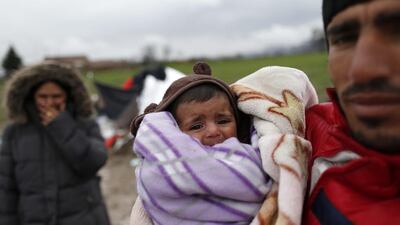Throughout history, the idea of conflict has often been used by governments, factions and tribes to market change and to promise a brighter future. For many, that future has meant stories told posthumously about their bravery in battle, or the ability to answer their children with confidence when they ask: “What did you do in the war?”
Why has this question resonated so strongly with so many generations? It demands that we answer for posterity, if not ourselves, what we stand for and for what cause we would lay down our lives. I believe this question holds value, now more than ever. No longer as a call to arms, but an invitation to consider the values we hold in the face of conflict.
The war in Syria is the great humanitarian crisis of our time, and much has been made of its complexity. The media is full of articles, videos and infographics attempting to explain the conflict and its many participants. But I would like to offer an alternative: whatever complexities exist in terms of politics, religion or military strategy, the real, tangible and immediate needs are far more simple. Aside from food, shelter and access to health care, people also have a right to dignity.
Between December 1, 2015 and January 29, 2016, it was widely reported that 49 people starved to death in Madaya, Syria. They died because sustained military siege strategies meant they were unable to receive food supplies. In the five years this war has raged, an estimated 250,000 people have lost their lives and 1.9 million have been left with permanent disabilities, while an estimated 4 million people have fled the country. In the face of such extreme human suffering, political rhetoric loses its lustre – are these not the people we wish to protect?
The Syrian crisis has long since become a global crisis and there has been extensive coverage of refugees desperately making their way to countries they hope will offer them the dignity and security they need. The decision to leave home is never an easy one and many Syrians endured the violence for years before finally opting to risk their lives crossing borders and seas, for a chance to begin their lives over.
As the conflict has progressed and more bombs have been dropped, medical facilities have also come under fire. Over the past five years, numerous medical staff inside Syria have worked to keep clinics open in the face of extreme personal danger. The needs they see on a day-to-day basis are overwhelming: there are more patients than can be provided for, and the lack of logistics and support means that the supplies are often insufficient – how can an operation room function without electricity or fuel for a generator? In time, many of these same people have fled Syria. Exhausted by the sheer volume of their task, exasperated by the lack of support and quite possibly wondering why the international community hasn’t answered their calls.
But in years to come, if they are faced with the question “what did you do in the war?” they will be able to say they did what they could. No matter how modest that contribution may be, it is a contribution that has alleviated some suffering.
The exodus from Syria has been compared to the refugee crisis of the Second World War. Another conflict involving most of the globe and comprising many nations and factions with different agendas. In hindsight the conflict has often been characterised as a fight between two sides. One suffering a justified defeat and the other a glorious victory. Undoubtedly it was not so clear-cut before the end.
With the cessation of hostilities in 1945 came the world’s opportunity to grieve. We did not grieve for military strategy, we did not grieve for politics, we grieved for loved ones. In today’s war, conflict has given little ground to compassion. In the past two weeks, there has been a drop in the number of casualties. This is largely because there has been a ceasefire (though even that has not been comprehensive). But ceasefires are not enough. Only with the end of conflict will we see the return to a simpler standpoint, a genuine evaluation of need.
Many now proclaim the uncertainty of Syria’s future. What hope is there for the Syrian people, unable to return home and unwanted by the rest of the world? I have no doubt that following the end of the Second World War, similar questions were posed over the fate of states, peoples and once beautiful, prosperous cities in Europe. But in time, with peace, they recovered. Hope, perhaps, is not entirely lost.
The door remains open; we need not continue down this road. With this in mind, I pose a question: in years to come, when you are asked “what did you do in the war?” what kind of answer would you like to give?
Mohamed Bali is executive director of Doctors Without Borders in the UAE

